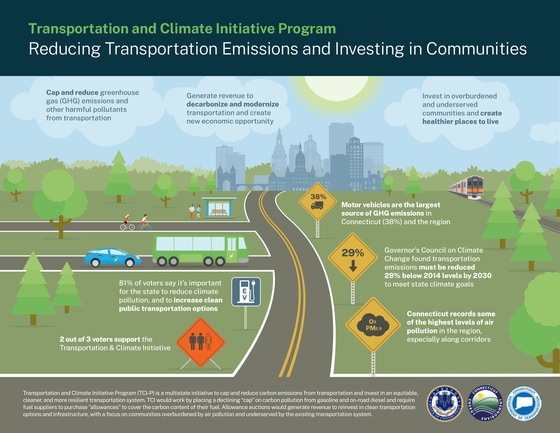Connecticut, Massachusetts, Rhode Island, D.C. Sign Transportation and Climate Initiative
The governors of Connecticut, Massachusetts, and Rhode Island, and the mayor of the District of Columbia, signed an agreement to charge fuel suppliers for the carbon content in diesel and gasoline. Revenues generated are to be used to reduce emissions, according to the agreement or memorandum of understanding.

The MOU sets the stage for a multi-jurisdictional program “that pursues systematic and substantial reductions in motor vehicle pollution – the largest source of greenhouse gas (GHG) emissions –and re-invests $300 million each year across these jurisdictions in cleaner transit, modern infrastructure, and healthier communities,” according to an announcement. Here is more from the announcement, edited for length and clarity:
The bipartisan Transportation and Climate Initiative Program (TCI-P) will work by requiring gasoline and diesel fuel suppliers to purchase emission allowances for the pollution caused by the fuels they sell in participating states. The total number of allowances would decline each year, resulting in less transportation pollution. Each participating jurisdiction will independently decide how to invest program proceeds to achieve the goals of the MOU.
The program will guarantee [participating jurisdictions] at least a 26 percent reduction in carbon emissions from transportation from 2022 to 2032, and is anticipated to generate annual revenue of up to $89 million in 2023, increasing to as much as $117 million in 2032. Connecticut [for example] will re-invest these funds in equitable and cleaner transportation options, creating an employment program across transit, construction, and green energy, and a catalyst for infrastructure development through the next decade and beyond.
TCI-P was developed through a collaboration of Northeast, Mid-Atlantic, and Southeast jurisdictions, known as the Transportation and Climate Initiative (TCI), with input from people, businesses, and organizations. Several other jurisdictions released a joint statement signaling their continuing commitment to work with Connecticut, Massachusetts, Rhode Island, and the District of Columbia on the development of the regional program while pursuing state specific initiatives to reduce emissions and provide clean transportation solutions.
The three states and the District of Columbia account for 73 percent of the transportation emissions, 76 percent of the vehicles, and 75 to 80 percent of the gross domestic product in New England, according to the announcement, issued Dec. 21.
“As a commonwealth, we have an obligation to address climate change head on and a challenge this great requires action across our region and nation,” Massachusetts Gov. Charlie Baker said. “By partnering with our neighbor states with which we share tightly connected economies and transportation systems, we can make a more significant impact on climate change while creating jobs and growing the economy as a result. Several other Transportation and Climate Initiative states are also committing to this effort today and we look forward to these partners moving ahead with us as we build out this first in the nation program.”
Rhode Island Gov. Gina Raimondo said, “This first-of-its-kind program will provide $20 million annually for public transit, safe streets for bikers and pedestrians, and other green projects. Most importantly, it will provide much-needed relief for the urban communities who suffer lifelong health problems as a result of dirty air. I look forward to working with the Rhode Island General Assembly to launch this program and protect the health of Rhode Islanders.”
“My vision is for the District to be the healthiest, greenest, most livable city for all our residents,” Mayor Muriel Bowser said. “To realize that vision, we have ambitious goals – for mobility, equity, and climate – and this program is an opportunity to accelerate all three, together.”
The jurisdictions commit through the MOU to allot no less than 35 percent of the annual proceeds to assist communities overburdened by transportation pollution and associated negative health impacts and underserved by the current transportation system.
Example investments may include improving existing public transit systems; developing new bus routes in suburban and rural communities; developing bus rapid transit; electrifying buses, rail, and state fleets; developing highway preservation to reduce congestion; expanding safe bike lanes, bike paths, walking trails, and sidewalks; expanding bike-share programs; improving high speed wireless internet in rural and low-income areas; creating rebates for electric and low-emission vehicles; developing charging infrastructure; developing interstate electric vehicle charging corridors; and creating incentives for continued telecommuting.
